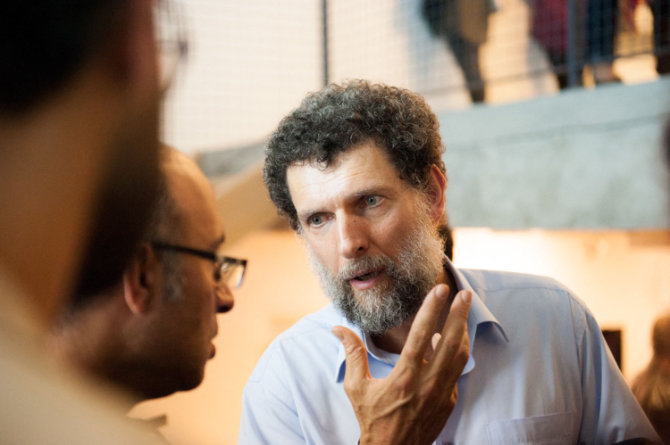Diplomatic row heats up in Turkey over envoys’ joint declaration
ANKARA: The joint declaration by 10 ambassadors of Western countries urging the release of the 64-year-old jailed philanthropist Osman Kavala continues to shape domestic politics in Turkey, with President Recep Tayyip Erdogan ordering the Foreign Ministry to declare the envoys “persona non grata.”
The move is expected to have domestic and international political and economic repercussions.
Kavala, who denies the charges, is behind bars for four years, accused of financing nationwide anti-government protests in 2013.
The ambassadors of France, Germany, Norway, Sweden, Finland, New Zealand, the US, Canada, Denmark and the Netherlands called for a quick and just resolution of Kavala’s case on Oct. 18 — the day marking four years of the start of his detention.
We “believe a just and speedy resolution to his case must be in line with Turkey’s international obligations and domestic laws. Noting the rulings of the European Court of Human Rights on the matter, we call for Turkey to secure his urgent release,” the ambassadors’ statement read, echoing the European Court of Human Rights ruling on its member country Turkey.

The ambassadors were summoned by the Foreign Ministry after the release of the statement.
“I gave the necessary instruction to our foreign minister and said what must be done: These ten ambassadors must be declared persona non grata immediately,” Erdogan said in a speech on Saturday.
“They will know and understand Turkey. The day they do not know and understand it they will leave,” he added, noting that these ambassadors would not release “terrorists” in their own countries.
A declaration of “persona non grata” — an envoy who is no longer welcome — is a diplomatic move that is one step before expulsion.
The Turkish government considers the ambassadors’ declaration as direct interference into domestic politics, rather than reminding European top court’s ruling.
In the meantime, Kavala, who served on the advisory board of US philanthropist George Soros’ Open Society’s national foundation in Turkey until 2018, released a statement on Friday saying that he would not attend his next trial on Nov. 26 to deliver his defense, as he believes his hearing would be not fair in light of recent circumstances.
The ambassadors referred to the ECHR in their declaration. The top European court urged the immediate release of the Turkish philanthropist in late 2019, saying that his detention was aimed at silencing him.
Last month, the Council of Europe warned that infringement proceedings against Ankara would begin at the end of November if Kavala was not released.
The Danish, Dutch and Norwegian embassies in Turkey said that they had not received any notification from Turkish authorities and would continue to urge Turkey to comply with its international obligations.
Experts, however, note that the expulsion of 10 European and North American ambassadors — unprecedented in Turkish political history — may trigger actions in kind from these countries.
“As elsewhere in the world, all politics is local,” Ozgur Unluhisarcikli, Ankara director of the German Marshall Fund of the US, told Arab News.
“Turkish foreign policy has been driven excessively driven by domestic political considerations and this case is no different,” he said.
According to Unluhisarcikli, Erdogan’s instruction to the Turkish Ministry of Foreign Affairs to declare these ambassadors as “persona non grata” may please his voters and divert attention from domestic troubles, but it will also contribute to Turkey’s international isolation at a time when the country is already under US sanctions and came close to being sanctioned by the EU last year.
Last year, the US administration sanctioned the Turkish defense industry over its purchase of the Russian-made S-400 surface-to-air missile system. The action was taken under the 2017 Countering America’s Adversaries Through Sanctions Act.
“Moreover ,Turkey is going through a currency crisis, which could trigger a financial crisis about 18 months before the presidential and parliamentary elections scheduled for June 2023,” Unluhisarcikli said.
In public statements, Turkey’s former ambassadors underlined that although harsh reactions could be given in diplomatic proceedings, the main goal should be the management and resolution of the crises.
Abdurrahman Bilgic, a retired envoy who served as the ambassador to Tokyo and the UK, said the ambassadors in Turkey had the right to declare their countries’ stance on Kavala’s release, either individually or through a joint declaration.
“In return, the Turkish Foreign Ministry can also retaliate with a declaration to show their uneasiness. But in the meantime the ambassadors should not target our ruling government and judiciary with their consecutive social media statements,” he told Arab News.
However, for Bilgic, declaring these diplomats “persona non grata” would not serve Turkey’s interests and could trigger retaliation.
“If the process is being handled like this, Turkey could not only loose its voting rights at the Council of Europe but even its membership,” he said.
Article 90 of the Turkish Constitution provides that in the case of conflict between international agreements in the area of fundamental rights and freedoms, the provisions of international agreements shall prevail.
“Expelling ambassadors is not the way to defend national interests or to explain one’s position on any given matter. Impulsive foreign policy with an eye on domestic politics has only served to aggravate Turkey’s isolation. This should not be deepened through rash action,” tweeted Alper Coskun, the former Turkish ambassador to Azerbaijan and senior fellow at Washington-based think-tank Carnegie Endowment.
In the past 50 years, Turkey has declared only three diplomats — one from Libya in 1986, Syria in 1986, and Iran in 1989 — as persona non grata, while the last foreign ambassador Ankara declared persona non grata was an Iranian envoy.


Turkey extends detention of civil society leader Kavala



